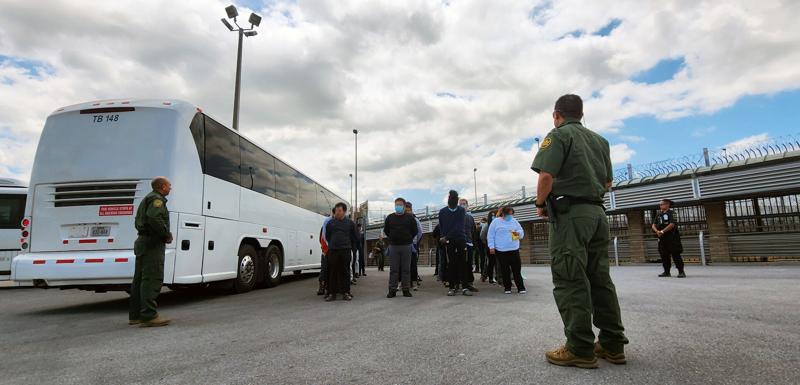(The Center Square) – More city, town and county officials in Illinois are taking steps to prevent Chicago’s influx of immigrants from overflowing into their communities.
Drivers northbound on Interstate 55 over the holidays may have seen signs in Grundy County that read “No Migrant Buses This Exit.”
“We did that to signal to the bus companies and the bus drivers to not stop here because you’re not going to get a warm welcome,” Grundy County Board Chairman Chris Balkema said. “We love to have people coming through as tourists and through the legal path. The measures we are putting in place in January are for the unplanned buses.”
Balkema recently advanced a resolution that makes Grundy County a non-sanctuary county.
“Not only is Grundy County non sanctuary, as reflected in December, but in January we will do everything we can do to proactively move the immigrants down to the intended destination, a so-called city that’s going to welcome them, Chicago,” said Balkema, who is running for Illinois Senate.
Balkema said there are dangers of human trafficking with migrants being dropped off at just any rural truck stop in the state.
“A bad person can show up and say, ‘Hey, these five people … come with me and I’ll take you.’ And you take them and then you never hear from them again,” Balkema said.
Chicago, which has seen nearly 30,000 non-citizen migrant arrivals since August 2022, has already fined several buses $5,000 for violating migrant drop off regulations with the possibility of buses that violate the rules being impounded. Busloads of migrants from the southern U.S. border have since been sent to other places like Rosemont and Cicero.
In October, Joliet Township decided it will no longer ask for a state grant to house migrants. This announcement came after a meeting when residents claimed township officials were trying to push through an $8.6 million grant deal.
In Grundy County, Balkema is ramping up his resolution of being a non-sanctuary county with an emergency plan. The county is making it clear it will not take grant money from the state to address migrants that end up in the county nor will it be “welcoming.”
“What happens if a bus drops off 50 people at a bus stop or at a truck stop at 3 a.m., and the bus driver takes off, and we’ve got 50 people that are standing in blankets,” Balkema asked. “What do we do?”
At its Jan. 9 meeting, the board is expected to vote on a resolution addressing unplanned buses that stop in Dwight, Morris or anywhere in the county. If the resolution passes, law enforcement will be used to get the buses to keep moving. If the bus driver manages to drop migrants off and leaves before law enforcement can get there, the county will take migrants to the nearest train station.
“They’re destination is not Grundy County and we want to make sure they keep moving,” Balkema said.
If the county gathers intelligence that immigrants are being housed in hotels, Balkema said he is certain he and the board will follow Rosemont, Schaumburg and other municipalities in Illinois that have already implemented ordinances that issue fines for housing someone over 30 days in a hotel.
“But that is not happening right now,” Balkema said. “I can’t believe we are having this conversation. People are just walking across the border and there are risks. You look at things like sex trafficking and you have men, women and children who could get dumped off at any rural truck stop standing in blankets.”
Balkema said if officials don’t put proactive measures in place, Grundy County could be held accountable for bad things that may happen.
“Unfortunately we have a federal government and a governor that says ‘it’s OK, let’s find a way to welcome them,’” Balkema said. “The best way we can help those in need is to prevent people from being put in harm’s way.”
State lawmakers like Reps. Dan Caulkins, R-Decatur, Chris Miller, R-Oakland, and Brad Halbrook, R-Shelbyville, went to Eagle Pass, Texas, last week to see the border crisis first-hand. Caulkins said the surge is coming and it’s “unsustainable.”
“It is depressing to be here,” Caulkins said in a live social media video from the southern border.







